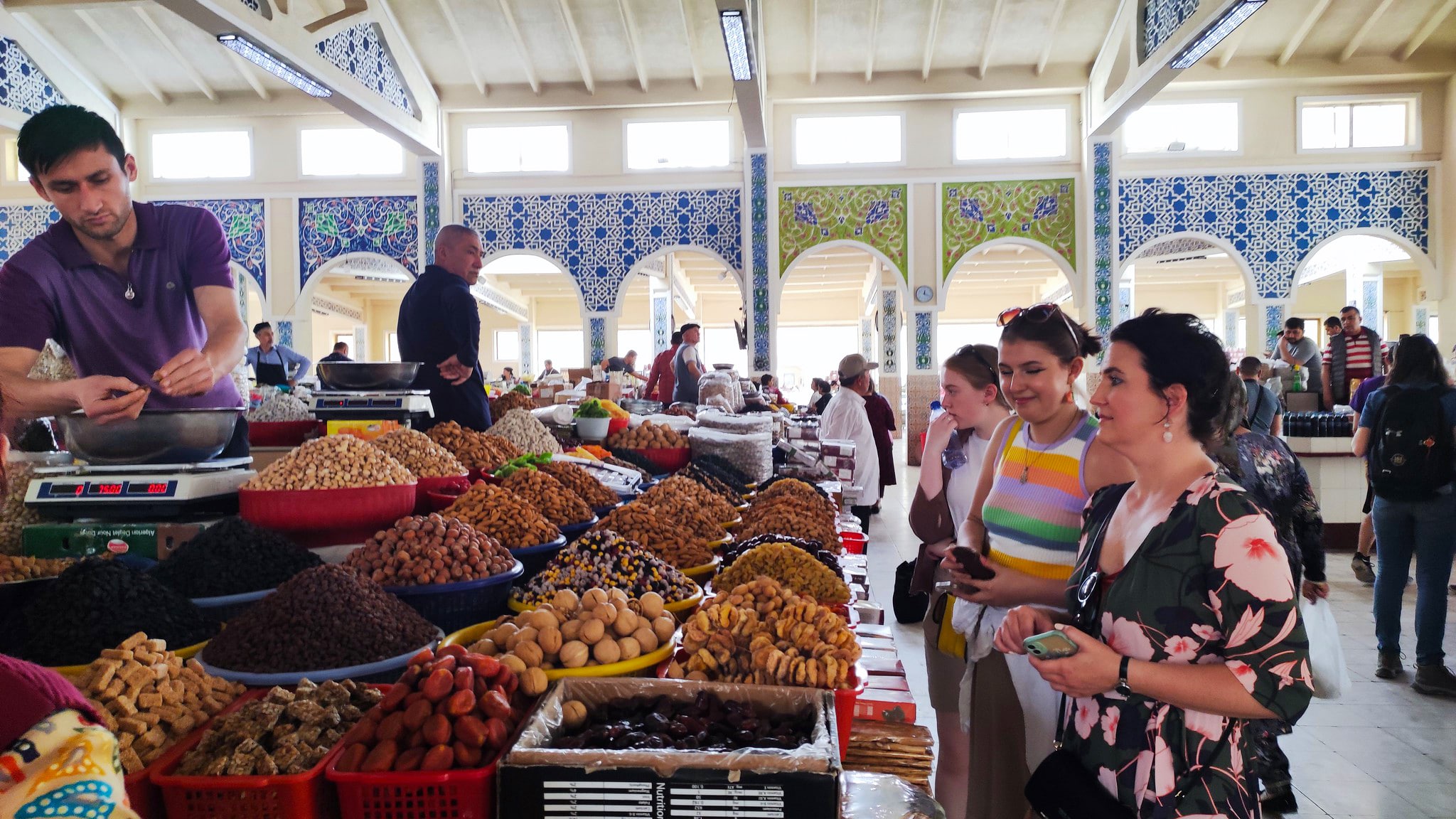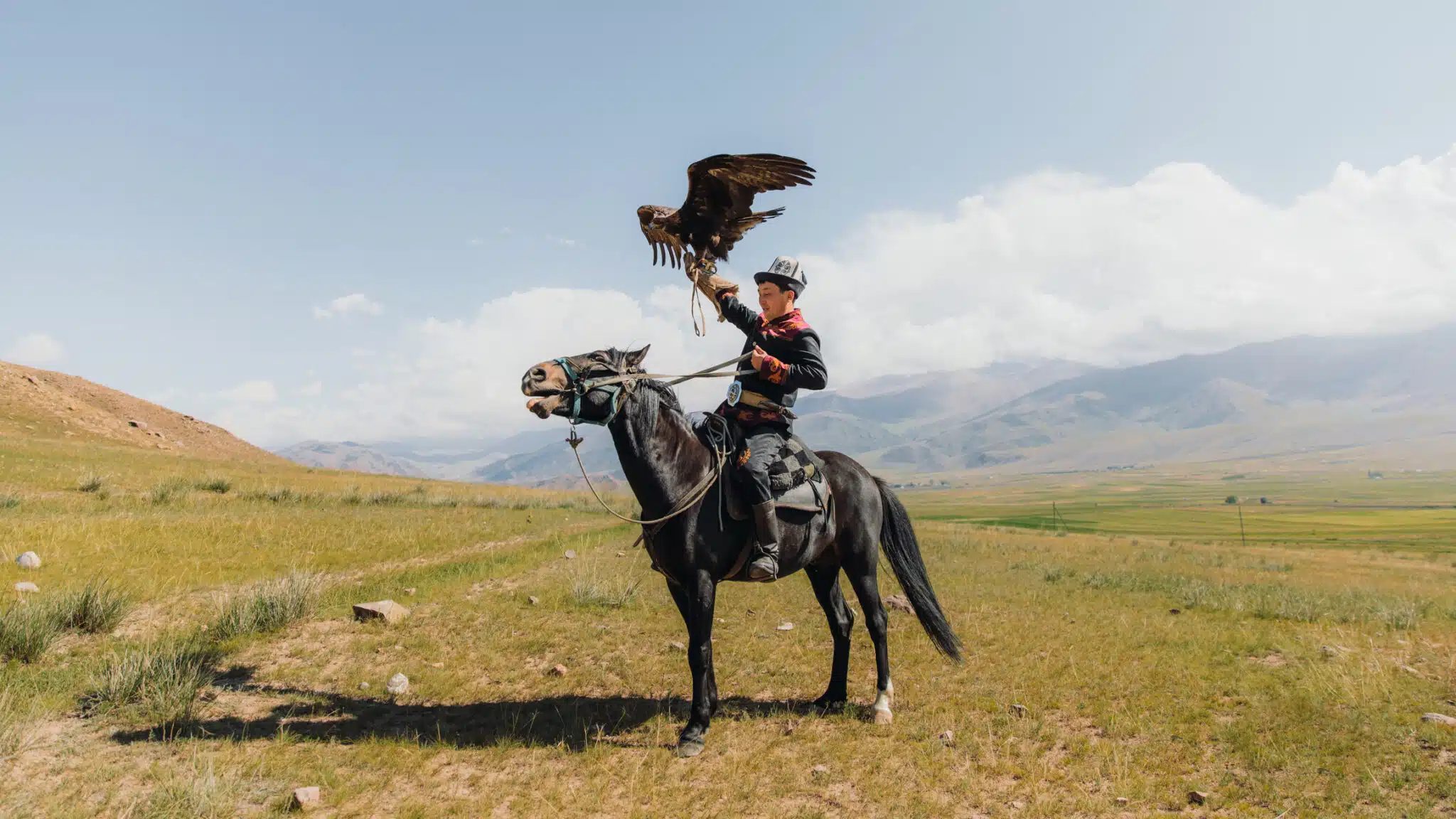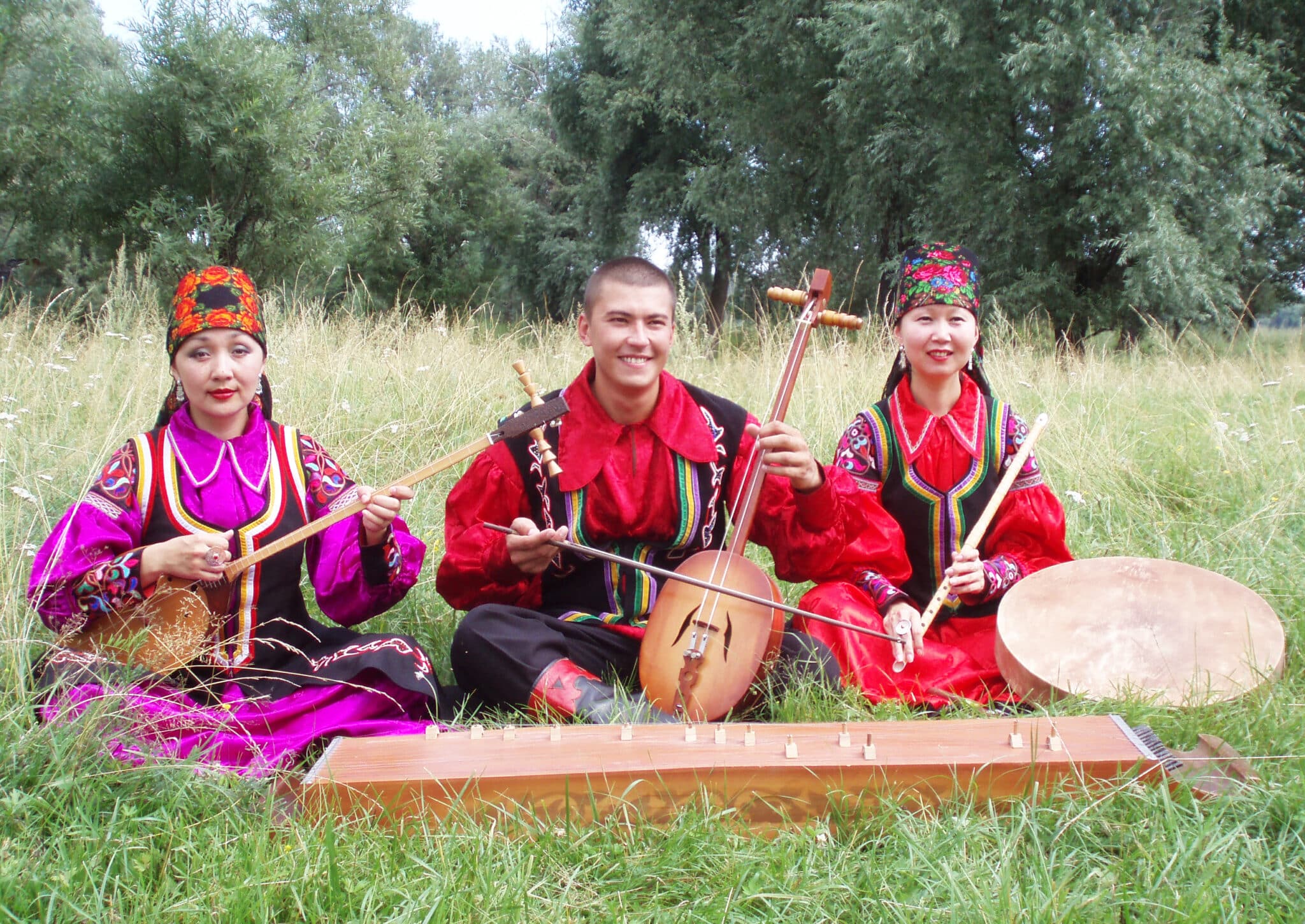The Talking Phrasebook Series presents useful phrases and words in side-by-side translation and with audio files specifically geared to help students work on listening skills and pronunciation. Each entry below, divided by category, features an English word or phrase in the left column and its Khakas translation in the right, presented in the original Khakas (below) and with an English-friendly transliteration (above).
Khakas is a Turkic language that is now classified as endangered. There are about 73,000 ethnic Khakas people, of which only about 54,000 speak the language. Most live in the Khakas Republic in Russia and the vast majority of Khakas speakers are bilingual in Russian. Younger generations are increasingly shifting to Russian as their primary language. Efforts are being made to preserve and promote the language, including the establishment of Khakas-language schools and cultural institutions within the Republic. Some young people are also now championing their language as a point of national pride and encouraging other Khakas to do the same.
In the center column for each row is a play button. The recorded file will feature first English, then the Khakas in three versions: one slow, one with each syllable broken out, and a last version that will be spoken as it might be overheard in a conversation between native speakers.
Interesting Facts about Khakas
- Internet Fame: Although Khakas is an endangered language, new songs in Khakas have gained millions of views on YouTube thanks to the band Otyken.
- Name: Khakas speakers also refer to their language as “tadar,” a form of the word “tatar.” The name tatar is used by many speakers of Turkic languages to refer to their various languages.
- Alphabet: The Orkhon-Yenisei monuments show that Khakass was written in a runic alphabet perhaps as early as the 7th Century. The monuments were erected to commemorate the brothers Bilge Khagan (683-734) and Kul-Tegin (684-731), one a civil leader and the other a military commander. By the 9th Century, the runic script was replaced by the Uighur alphabet, which developed from Sogdian. Today, the language is written using a modified version of the Cyrillic script, which was introduced to the region during the Soviet era.
- Dialects: The modern Khakass language is the result of the historical consolidation of the Kachin, Sagai, Kyzyl, Shor, Koibal, and Beltyr tribal languages. Traces of these languages can be seen in Khakas dialects, which have retained the corresponding names. The Sagai dialect is considered the standard variety and is used in official documents and publications. The resource below uses this dialect. Click here for more on Khakas dialects.
- Literary Khakass does not completely coincide with any of the dialects and selectively combines the features of phonetics, morphology and vocabulary of different dialect groups.
- Vowel Harmony: Like other Turkic languages, Khakas has vowel harmony, meaning that the vowels in a word must belong to the same vowel class. Khakas also has agglutinative morphology, where words are formed by adding suffixes to a root. For example, the word palalaryma (“to my children”) consists of the stem pala (“child”) and the affixes lar (plural), ym (“my”) and a (dative).
- Cases: The Khakas language has ten cases, each with its own affix. These include the nominative, genitive, dative, accusative, locative, ablative, allative, instrumental, comparative, and prepositional. Click here for more on Khakas grammar.
- Tenses: The Khakas language has a rich system of tenses. For time, different conjugations exist for past, immediate past, present, and future. Within these, a system of affixes indicate perfective and imperfective, active and passive, conditional, as well as various situations like when an action is not witnessed by the speaker. Verbs can take up to five affixes to convey the most accurate meaning.
- Word order: Khakas uses the SOV fixed word order: subject – object – verb. The grammatical use of the word is dependent on its placement in the sentence. For example, Silig khys (“Beautiful girl”) – Khys сіліг (“The girl is beautiful”). Oinapchatkhan pala (“The child who plays”) – Pala oynapchatkhan (“The child played”). The word order of all clauses within a sentence also follow specific rules according to the laws of Turkic syntax: the definition always comes before the defined. For example, the sentence “Ayas tigirdegi puzik turchatkhan kannin sustary appagas harda sagylys turgan” (“The rays of the sun rising in the clear sky sparkled on the white-white snow”) is literally translated as follows: ayas (“clear”) tigirdegi (“located in the sky”) puzik (“high”) turchatkhan (“standing”) kannіn sustary (“sun rays”) appagas (“white-white”) harda (“in the snow”, local case) sagylys turgan (“sparkled”).
Khakas Unique Characters
Khakas uses the Cyrillic script, which is shared by many other languages in the region. However, it has several characters that are not used in Russian and might be unfamiliar to those who have previously studied languages written in Cyrillic.
Because these characters are typically not available as a default on most computers and telephones, most Khakas use Russian Cyrillic and/or Latin characters to write their language phonetically in a somewhat simplified script. Note that the below resource uses this simplified script.
Here are some examples of Khakas letters that are not held in common with Russian:
| Khakas letter: | Pronunciation: | Comment: |
| Ӧ, ӧ | yo | This letter represents the front rounded vowel sound /ø/, which is not found in standard Russian. It is similar to the German “ö” sound. |
| Ө | ö | This letter represents the back rounded vowel sound /ɵ/, which is also not found in standard Russian. It is similar to the Turkish “ö” sound. |
| Һ, һ | h | This letter represents the voiceless glottal fricative sound /h/, which is also found in other Turkic languages such as Turkish and Azerbaijani. |
| Ң, ң | n | This letter represents the velar nasal sound /ŋ/, which is found in many languages including English (in words like “singer” and “ring”). |
| ғ | kh | |
| ҷ | ch | |
| i | i | |
| Ӈ, ӈ | һ | This letter represents the palatal nasal sound /ɲ/, which is found in words like “gnome” and “lasagna”. |
Survival Basics
| Hello! | Izen! (Изен!) *informal, conversational – to greet a friend |
|
| Hello! | Izenner! (Изеннер!) *more formal – to greet a teacher/passer-by |
|
| Yes | Ya (Я) |
|
| No | Choh (Чох) |
|
| Good morning! | Chalahaj irtenen! (Чалахай иртенен!) |
|
| Good afternoon! | Chalahaj kunnen! (Чалахай куннен!) |
|
| Good evening! | Chalahaj iirnen! (Чалахай иирнен!) |
|
| Good night! | Amyr haraanan!
(Амыр хараанан!) |
|
| How are you? | Kirekter hajdi parcha? (Киректер хайди парча?) |
|
| Good, thanks, and you? | Chahsy, alhystapcham. Kirekter hajdi parcha? (Чахсы, алхыстапчам. Киректер хайди парча?) |
|
| Good bye! | Anymchoh! (Анымчох!) |
|
| See you later! | Paza togaskhancha! (Паза тогасханча!) |
|
| Sorry! | Pyrom tastanar! (Пыром тастанар!) |
|
| Open/closed | Azyh/chabyh (Азых/чабых) |
|
| Pull/push | Minnzer/minnen (Mиннзер/миннен) *when referring to a door |
|
| Small/big | Kichih/chong (Кичиг/чоон) |
|
| Do you speak English? | Sin anglijskaj tili choohtancham ba? (Син английскай тили чоохтанчам ба?) |
|
| I don’t speak English. | Min angliskijdin tilinin chohtaspincham. (Мин англискийдин тилинин чохтаспинчам ) |
|
| I only speak a little Khakas. | Min orys tilin sala-sula choohtancham. (Мин орыс тилин сала-сула чоохтанчам) |
|
| I understand/I don’t understand. | Min onarcham (Mин онарчам)/Min pil polbincham (Mин пил полбинчам) |
|
| Thank you!/Thank you very much! | Algys!/Algys polzyn! ( Алгыс!/Алгыс ползын!) |
|
| Very well, thanks! | Tyn chahsy, algys! (Тын чахсы, алгыс!) |
|
| Good/bad | Сhahsy/Homaj (Чахсы/Хомай) |
|
| Please | Suryn (Сурын) *When asking for something politely |
|
| You’re welcome! | Charir! (Чарир!) *when responding to “Алгыс!” |
|
| Excuse me! | Пыром тастанар! (Pyrom tastanar!) |
|
| A little | Koп нимес (Kyop nimes) |
|
| Could you speak more slowly? | Sala agyriin choohtanynardah? (Cала агыриин чоохтанынардах?) |
|
| Could you repeat, please? | Hatap choohtap piriner! (Хатап чоохтап пиринер!) |
|
| Could you write that down? | Рas pirinerdek? (Пас пиринердек?) |
|
| My bag/wallet/passport was stolen | Minen hapchyh/ymny/ogyrlap apparybyskhannar. (Минэн хапчых/ымны/огырлап аппарыбысханнар). |
|
| I need a doctor! | Magaa imchi kirek! (Магаа имчи кирек!) |
|
| Call the police! | Policiyane sygdyran! (Полицияне сыгдыран!) |
Introductions in Khakas
| What is your name? | Adynar kemdir? (Адынар кемдир?) |
|
| Pleased to meet you! | Sirernen tanyzyp alganyma orinchem! (Сирернен танызып алганыма оринчем! |
|
| I am 25 years old. | Magaa chibirge pis chas. (Магаа чибирге пис час.) |
|
| How old are you? | Sagaa ninche chas? (Сагаа нинче час?) |
|
| Where are you from? | Sin pozyny hajdanzin? (Син позыны хайданзин?) |
|
| I am American. | Min amerikatanmyn. (Мин америкатанмын) |
|
| No, I am from Canada. | Choh min kanadatanmyn. (Чох, мин канадатанмын) |
|
| She is Australian. | Ol avstraliyadanmyn. (Oл австралияданмын) |
|
| He is Irish. | Ol irlandiyadanmyn. (Oл ирландияданмын) |
|
| We are from New Zealand. | Pys Naa Zelandiyanan bys. (Пыс Наа Зеландиянан быс ) |
|
| They are from Wales. | Ollar Uel’stan nar. (Оллар Уэльстан нар) |
|
| How do you like Khakassia? | Sin Hakasiyada polarga hynchan? (Син Хакасияда поларга хынчан?) |
|
| I like Khakassia very much. | Мin Hakasiyada ugaa polarga hyncham. (Мин Хакасияда угаа поларга хынчам) |
|
| Have you ever been to Abaza? | Sin Abazada polgazin? (sg., m/f), Sirer Abazada polgazar? (pl./formal) (Син Абазада полгазин? Сирер Абазада полгазар?) |
|
| I have never been to Chernogorsk before. | Min Haratasta polbaam. (Мин Харатаста полбаам) |
|
| This is my second time in Russia. | Min ikіnchi hati Orys chirda. (Мин икінчи хати Орыс чирда.) |
|
| What do you do? | Sin nime itchezin? (Син ниме итчезин?) |
|
| I am a student/businessman/teacher/doctor. | Min student/biznesmen/ugretchi/imchi. (Мин студент/бизнесмен/угретчи/имчи) |
|
| I am on vacation. | Min otpuskta/kanikullarda), (Мин отпускта/каникулларда). |
|
| I am here on business. | Min mynda togystygtar kirektere. (Мин мында тогыстыгтар киректере). |
Asking Directions
| Where are the toilets? | Tualet hajdadyr? ( Туалет хайдадыр?) |
|
| Men | Ir (Ир) |
|
| Women | Ipchi (Ипчи) |
|
| Where is the nearest bank? | In chagyn bank hajdadyr? (Ин чагын банк хайдадыр?) |
|
| Where is the nearest post office? | In chagyn pochta hajdadyr? (Ин чагын почта хайдадыр ?) |
|
| Where is the nearest train station? | In chagyn vokzal hajdadyr? (Ин чагын вокзал хайдадыр?) |
|
| Where can I find Wi-Fi? | In chagyn Wi-Fi hajdadyr? (Ин чагын Wi-Fi Хай Дадыр ?) |
|
| Do you know the Wi-Fi password? | Hajdag vajfajlyg parol’ ba? (Хайдаг вайфайлыг пароль ба?) |
|
| How can I order a taxi? | Taksi hajdi hygyrarga? (Такси хайди хыгырарга?) |
|
| Straight ahead! | Sirerge alnynzar! (Сирерге алнынзар!) |
|
| Take a right!/Take a left! | Yon sarinzar! (Он саринзар !)/Sol carinzar! (Сол cаринзар!) |
|
| After the stoplight | Svetofor kistinde Светофор кистинде |
|
| Next/First/Last | Pazagy (Пазагы) Pastagy (Пастагы ) Halganchy (Халганчы) |
Shopping
| How much does that cost? | Pu ninchee turcha? (Пу нинчее турча?) |
|
| The menu, please! | Menyu pirinerdek! (Меню пиринердек!) |
|
| I’d like a beer, please | Haargan pivo piriner, (Хаарган пиво пиринер). |
|
| I’d like the bill, please. | Sanazybyzynardah? (Саназыбызынардах?) |
|
| Do you accept credit cards? | Sirer kreditnaj kartlar alchazar ba? (Сирер кредитнай картлар алчазар ба?) |
Counting
These are grouped for simplicity – for example 0-10, 11-20, 21-100, 101-1000)
| 0 | nol’ (ноль) |
|
| 1 | pyr (пыр) |
|
| 2 | iky
(икы) |
|
| 3 | us (ус) |
|
| 4 | tort (торт) |
|
| 5 | pis (пис) |
|
| 6 | alty (алты) |
|
| 7 | chity (читы) |
|
| 8 | sigys (сигыс) |
|
| 9 | togys (тогыс) |
|
| 10 | on (он) |
|
| 11 | on pyr (он пыр) |
|
| 12 | on us (он икы) |
|
| 13 | on us (он ус) |
|
| 14 | on tort (он торт) |
|
| 15 | on pis (он пыс) |
|
| 16 | on alty (он алты) |
|
| 17 | on chity (он читы) |
|
| 18 | on sigys (он сигыс) |
|
| 19 | on togys (он тогыс) |
|
| 20 | chibirgy (чибирги) |
|
| 21 | chibirgy pyr (чибирги пыр) |
|
| 22 | chibirgy us (чибирги ус) |
|
| 30 | otys (отыс) |
|
| 40 | hyryh (хырых) |
|
| 50 | ilig (илиг) |
|
| 60 | alton (алтон) |
|
| 70 | chiton (читон) |
|
| 80 | сigizon (сигизон) |
|
| 90 | togyzon (тогызон) |
|
| 100 | рir chuus (пыр чуус) |
|
| 111 | sto odinnadsat’ (пыр он пыр) |
|
| 125 | sto dvadsat’ pyat’ (пин чибирги пис ) |
|
| 200 | Iki chuus
(ики чуус) |
|
| 300 | trista (ус пыр) |
|
| 400 | chetyresta (торт пыр) |
|
| 500 | pyat’sot (пис пыр) |
|
| 600 | alty pyr (алты пыр) |
|
| 700 | chity pyr
(читы пыр) |
|
| 800 | sigys pyr (сигыс пыр) |
|
| 900 | togys pyr (тогыс пыр) |
|
| 1000 | pir mun (пир мун) |
More Phrasebooks

The Talking Polish Phrasebook
The Talking Phrasebook Series presents useful phrases and words in side-by-side translation and with audio files specifically geared to help students work on listening skills and pronunciation. Each entry below, divided by category, features an English word or phrase in the left column and its Polish translation in the right. In the center column for […]

The Talking Uzbek Phrasebook
The Talking Phrasebook Series presents useful phrases and words in side-by-side translation and with audio files specifically geared to help students work on listening skills and pronunciation. Below, you will find several useful phrases and words. To the left is the English and to the far right is the Uzbek translation. Uzbek is currently transitioning […]

Armenian Talking Phrasebook
The Talking Phrasebook Series presents useful phrases and words in side-by-side translation and with audio files specifically geared to help students work on listening skills and pronunciation. Below, you will find several useful phrases and words. To the left is the English and to the above right is an English transliteration of the Armenian translation. […]

The Talking Kyrgyz Phrasebook
The Talking Phrasebook Series presents useful phrases and words in side-by-side translation and with audio files specifically geared to help students work on listening skills and pronunciation. Below, you will find several useful phrases and words. To the left is the English and to the above right is an English transliteration of the Kyrgyz translation. […]

The Talking Serbian Phrasebook
The Talking Phrasebook Series presents useful phrases and words in side-by-side translation and with audio files specifically geared to help students work on listening skills and pronunciation. Below, you will find several useful phrases and words. To the left is the English and to the far right is the Serbian translation in both Latin and […]





